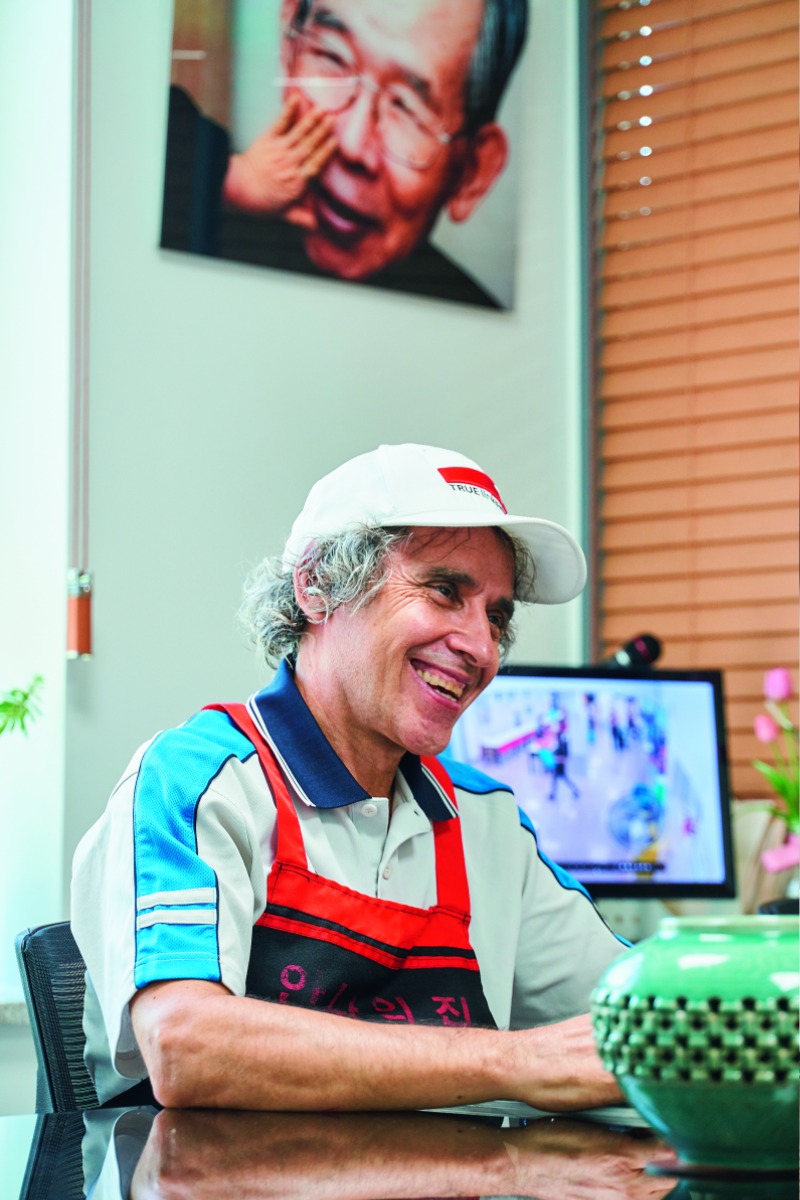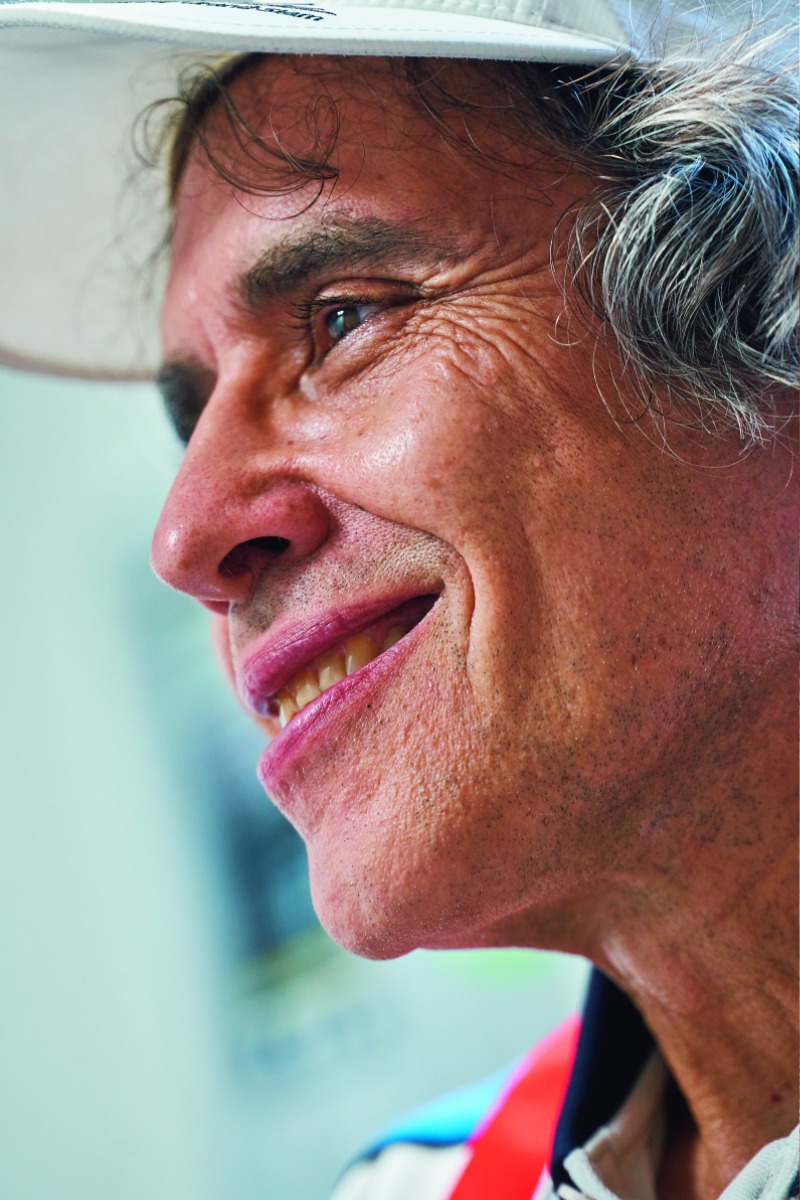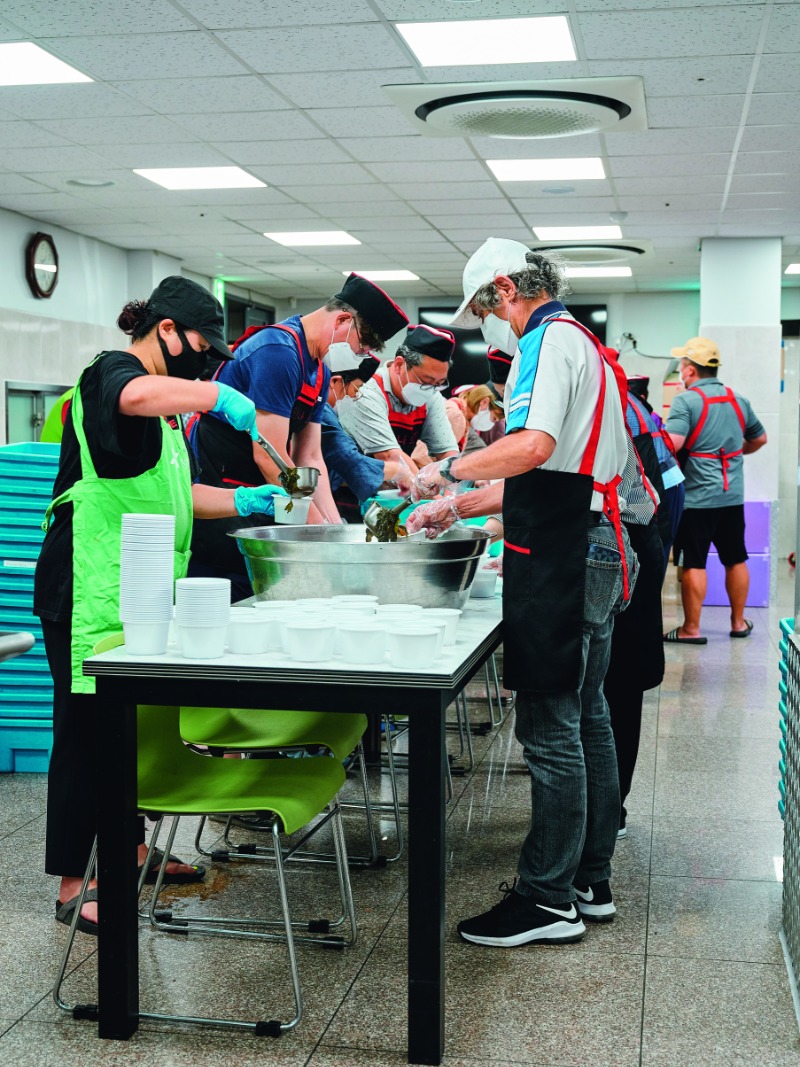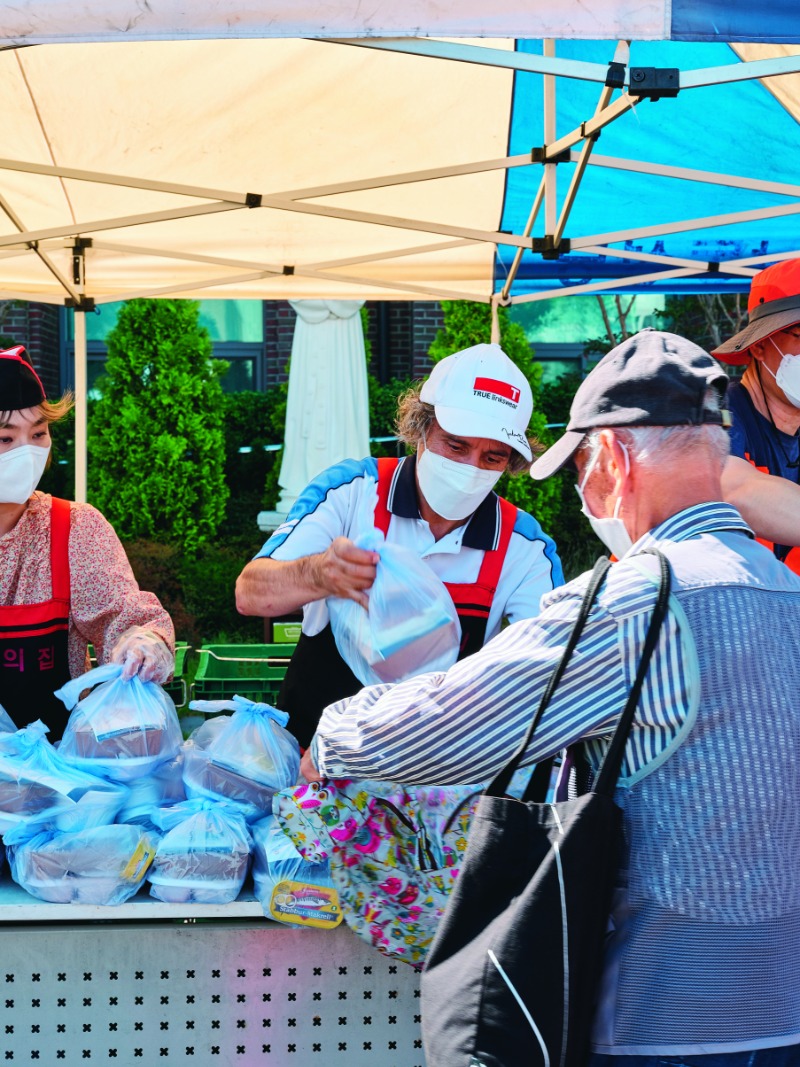Catholic Father Kim Ha-jong, born Vincenzo Bordo in Piansano, Italy, arrived in Korea in 1990 and embarked on a life dedicated to looking after the poor. Amid the coronavirus pandemic, his welfare center distributes lunch boxes to hundreds of hungry and homeless people each day.

For the past 30 years, an apron has been a necessity nearly every day for Father Kim Ha-jong. His office at Anna’s House soup kitchen in Seongnam, Gyeonggi Province, has a picture of Cardinal Stephan Kim Sou-hwan, the late archbishop of Seoul who was at the forefront of Korea’s democracy movement against military dictatorship in the 1970s to the 1980s.
As the COVID-19 Pandemic continues to menace the world, Father Kim Ha-jong is quietly spreading a different sort of virus.
He defines sharing as a “virus” that infects people with highly contagious happiness. At Anna’s House, the social welfare center that he operates in Seongnam, a satellite city of Seoul, sharing takes many forms. Since early 2020 when the pandemic first appeared in Korea, the most palpable of those forms has been the daily preparation of hundreds of lunch boxes for the poor and homeless.
Father Kim first opened his soup kitchen years before COVID-19. Most other soup kitchens shut down when indoor dining restrictions went into effect, but Father Kim refused to succumb. “You can’t close a soup kitchen because stomachs don’t go on vacation. Seventy percent of the people who come here have only one meal a day. If we don’t give them anything, they don’t eat,” he says.
FREE LUNCH BOXES
Making the switch to lunch boxes was difficult. It required a different operating system and higher costs due to packaging, as well as health risks for everyone involved. But since January 2020, with the permission of city authorities, Anna’s House has been providing some 650-750 lunch boxes daily with no major problems.
To Father Kim, every day feeding the needy is a miracle. He recalls one day when he realized that there was very little rice left. “Each day, we use 160 kg of rice. We only had two days’ worth left. I was worried, but the cook said, ‘Jesus will send some.’ The next day we found 100 sacks of rice left out front.”
In this way, people donate food , money, clothes, masks and various other goods. Many also volunteer their time to take care of food preparation, packaging, cleaning and managing the long queues for the lunch boxes. The volunteers assemble from all walks of life. They include not only Catholics but also Buddhist monks and Muslims, as well as celebrities, office workers and students. There’s even a dog named Louis Vuitton, who makes people smile.
The needy come from all quarters of Seongnam and even Seoul for the lunch boxes, which are handed out at 3 p.m. As they pass out the meals, Father Kim and the volunteers greet each recipient and say, “Welcome. We love you.”
“It’s true that the pandemic is giving us a difficult time. But here, it has become a time for the virus of love and sharing. It’s another experience of the pandemic that is really beautiful,” Father Kim says.
Before finishing high school, Vincenzo Bordo, the future Father Kim, had already decided to join the priesthood. After his university studies in Oriental philosophy and religions, he joined the Missionary Oblates of Mary Immaculate, whose focus is on serving the poor. His interest in Asia led him to Korea, and shortly after his arrival in May 1990, he started working with a nun who looked after poor families.
In his book, “A Moment of Fear, Miracles Every Day,” published in 2020, Father Kim recalls a turning point in 1992. He met a half-paralyzed man in his 50s who was living alone in a moldy basement and relying on neighbors to bring him food (or not eating at all on days when they didn’t). After talking to the man and tidying up the room, Father Kim hugged him with his permission and smelled a stench so foul he felt like retching. At the same time, he felt an indescribable happiness and peace.
DEDICATION
Realizing that so many people were left out of the welfare system, Father Kim started a canteen for the needy the following year. Korea was a different place back then. “People would ask me why I was feeding the homeless. They told me I shouldn’t do it because they are alcoholics who will only cause trouble. It’s not like that anymore. Our society has really changed,” he says.
In the wake of the Asian financial crisis in 1997, many people lost their livelihood and became homeless. The following year, Father Kim started a soup kitchen with the help of a benefactor whose mother’s name was Anna, hence the name Anna’s House. He started serving free meals every day except Sundays.
For many years, the soup kitchen operated out of a space provided by Seongnam Cathedral. But it had to be vacated in 2018. As the time to leave approached, Father Kim’s anxiety rose. Seongnam city officials advised him that greenbelt restrictions on the land across the road would be lifted and he could build a new place there. It wasn’t a viable solution, though; he didn’t have the money to buy the land. “I wondered if it was really the end,” he recalls. “I thought I might really have to stop and retire.”
Help came in the form of an interview request. Father Kim reluctantly relented, taking an appointment he mistakenly thought was with a local newspaper. But it turned out that the interview was with KBS, a national TV network, for its “Human Theater” (Ingan Geukjang) program. After the episode of Father Kim aired, “another miracle happened.” Donations flooded in, quickly reaching 1.2 billion won, enough to buy the land.
A NEW HOME
Anna’s House reopened in a new building in 2018. Although the soup kitchen is its primary concern, Father Kim’s efforts have led to an expansive list of services. Anna’s House currently offers medical care, rehabilitation, legal aid services and humanities education on a weekly basis; shelters for the homeless, elderly and runaway teens; a share house for youths; and a mobile outreach program for runaways and other vulnerable young people.

Father Kim says that it is love that gives him the energy to serve the needy in what was once a foreign country to him but is now his home. Whenever tough times have pushed him to the breaking point, someone always emerged to help keep Anna’s House open. He attributes the timing to the power of love.
Before COVID-19, the outreach program AJIT (acronym for aideul jikineun teureok, meaning “truck that safeguards the kids”) met with scores of boys and girls on the street each night. The pandemic has halted many activities, but Father Kim still takes AJIT, now a little bubble car, on the road from time to time. AJIT in Korean means “hangout” or “safe house.”
“We give hope. We plant the seeds of hope in people. The seeds can become big trees or fail. Nobody knows. But we are called to do whatever is possible,” he says.
For the past 30 years, Father Kim has donned an apron almost every day. On Sundays he swaps it for cycling gear and goes riding along the banks of the Han River, relishing in a precious moment of relaxation. Although wonderful things keep happening, it is mentally stressful – not to mention physically exhausting – to look after others so carefully day after day. When he noticed that his heart was beating faster than usual, he went to the doctor and was advised it was due to stress. For a while he had to give up his morning espresso, the only Italian habit that he has retained.
“You can’t close a soup kitchen because stomachs don’t go on vacation.
Seventy percent of the people who come here have only one meal a day. If we don’t give them anything, they don’t eat.”
GOD’S SERVANT
For all his hard work and giving, what does he receive in return? “Working with the poor makes me happy. For me, this isn’t a job. My mission, my life here, is to welcome these people, to love them and help them,” he says. This mission is reflected in his Korean name Ha-jong, which means “God’s servant.” The surname Kim is a tribute to Andrew Kim Tae-gon (1821-1846), the first Korean-born Catholic priest who was executed during the anti-Christian Joseon Dynasty and canonized in 1984 along with other Korean martyrs.
Father Kim’s work has not gone unnoticed. He has received many awards, including the prestigious Ho-Am Award in 2014. When asked which of the awards means the most to him, Father Kim beams and talks about a group of kindergarten children who recently presented him with a bundle of worn 1,000 won notes that they had saved up. Another reward that made him particularly happy is his Korean citizenship, granted by presidential order in 2015. Long before his naturalization, he decided he would stay in Korea forever; he even signed the papers for posthumous donation of his organs.
“I am Korean, not a foreigner,” he says. “When you fall in love, there is no reason for it.”

At 1 p.m. every day, volunteers gather at the kitchen in the basement of Anna’s House to prepare lunch boxes. They must move quickly to pack rice, side dishes, soup, bread, canned goods and other items. Father Kim (white cap) always works with them.

From 3 p.m., Father Kim and volunteers distribute lunch boxes to homeless people who line up in front of Seongnam Cathedral across the road from Anna’s House. For about two hours, more than 700 lunch boxes are handed out.